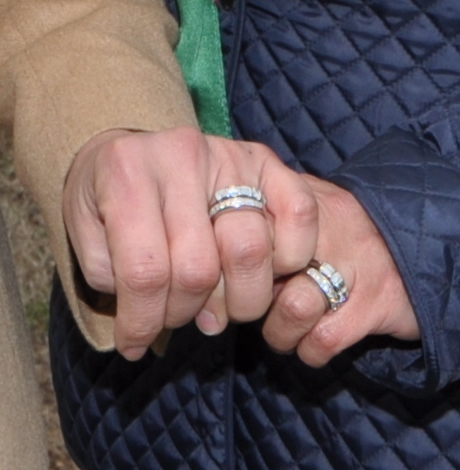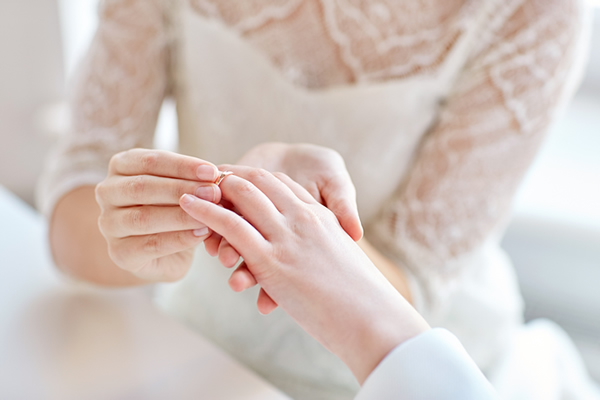Advice
Wedding attire debate triggers chain reaction of resentment
‘I don’t know how we lost our ability to agree and just get along’


Michael,
My wife and I got married last August. We were such a happy couple until the wedding. Our friends used to say they were going to get diabetes from being around us because we were so gooey. Now we are arguing way too often.
And it really started with the wedding, over a ridiculous disagreement. Were we both going to wear white dresses? Jen had her heart set on that, but I thought it was a dumb lesbian cliché and wore a tux (which I guess is another dumb lesbian cliché but more my style). I felt Jen’s anger and disappointment during the whole wedding.
Since then all sorts of things set us off. What route to take when we visit her parents? Can you please turn down the TV volume? Whose turn it is to change the cat litter? Please don’t look at your phone when I’m talking to you. How should we celebrate our first anniversary (which we don’t actually feel like doing anymore)? Why do you have that tone in your voice?
The problem is, sometimes I do have a tone in my voice. She’ll seem angry at me and then I’m on edge and angry at her. She’ll seem pissed off and I get fed up and don’t want to keep being conciliatory. Probably if you asked her, she’d say I start it. And sometimes I’m sure I do. I don’t want to be angry, but I don’t want to always have to say “yes” to keep the peace.
I think we’re both miserable that things are going so badly after less than a year. I don’t know how we lost our ability to agree and just get along. We used to always see things the same way and now it sometimes feels like we hate each other.
I’m beginning to wonder if this relationship is doomed, though everything seemed so wonderful at the beginning. Do other couples go through things like this and survive? If so, how do we get to the other side?
Michael replies:
Most couples are really gooey when they first get together. The idyll of new love renders us starry-eyed, gives us butterflies and leaves us feeling so blissful that we are happy to think everything the other person says and does is wonderful. We feel super connected and it’s easy to be on the same page all the time.
This gooey period is a great stage, because it creates a loving foundation on which to build a relationship.
But it’s just a stage. After a while, you find that you can’t always agree. You’re two different people and sometimes you’re going to have very different opinions. This is where you two now are.
Your anger at each other is a waste of energy. If you want to stay happily married, you should instead strive to embrace, with some humor, that you will sometimes disagree with each other over matters both small and profound.
This will require giving up the fantasy that you should always be able to agree, and giving up the belief that something is wrong if you don’t.
It will also require accepting that you aren’t right: you just have a different opinion from your spouse. Trust me on this: if you are trying to prove that you’re right, then you’re trying to prove that she’s wrong. And once you start down that road, it’s all downhill.
So in place of browbeating each other in an effort to get your way when you want two different things, take on the never-ending challenge of figuring out what you might do instead.
Do you agree to go along with what Jen wants? Do you stand your ground, even if it means that she stays home while you go to that movie she doesn’t want to see, or you skip her family reunion because you can’t stand her parents? And what happens when you disagree over a really big issue like what city to live in?
I can’t give you a rule book for how to resolve any of these scenarios, but here are some guiding principles: if you and Jen want to build a strong relationship that can tolerate your not always seeing eye to eye, you will both need plenty of generosity. You’re also going to have to accept that sometimes you will be disappointed in each other’s choices. That’s life.
Your first move, regardless of what Jen does, could be to stop being so wedded to your own positions. While there will be times that it is important that you do not yield, save that for more important matters than cat litter.
Michael Radkowsky, Psy.D. is a licensed psychologist who works with LGBT couples and individuals in D.C. He can be found online at michaelradkowsky.com. All identifying information has been changed for reasons of confidentiality. Have a question? Send it to [email protected].
Advice
Giving up drinking is killing our relationship
What happens when one partner is sober and the other isn’t

I’m a 38-year-old guy, was single for most of my 30s, which I didn’t like at all, and I finally met a great guy last Memorial Day Weekend.
Until New Year’s I would have said that everything was going great. I was on Cloud Nine. Eric is kind, handsome, smart, and a great catch.
But in December he decided to do “Dry January.” It was kind of on a whim I think. We were out with some friends and one of them said he was not going to drink at all for the month of January. He thought alcohol was playing too big a role in his life so he wanted to see what life would be like without it. Another friend said he would do it too, and then Eric said he would.
I wish we hadn’t gone out that night and then this whole thing wouldn’t have happened.
So, as the month progressed, Eric started talking more and more about how much better he was feeling without alcohol in his body or his life.
I don’t think we drank that much pre-January. Yes, we’d have something to drink every time we went out, with friends or just together, but not to excess.
At some point, Eric started saying that he wasn’t really enjoying going out with our friends, as he wasn’t drinking and they were (except the two friends who were also doing the Dry January thing). This meant I’d either go out without him (which I didn’t like) or we’d stay home, or go out just the two of us. But then if I’m drinking and he’s not, it just feels awkward. He hasn’t said anything but I feel like he’s judging me whenever I have a drink.
I was hoping he’d relax about the whole thing at the end of the month but now he’s decided he doesn’t want to drink anymore at all.
To make matters worse, he says that the month made him think more about the big role alcohol plays in his life (his words) and he has started going to Alcoholics Anonymous meetings.
So where does this leave me? I do want to keep drinking. I’m just a social drinker and I don’t have a problem with alcohol. I think it adds a fair amount of fun to my life. Plus, all my friends drink (including the two who did Dry January) and it’s a big part of our socializing. If you don’t drink when everyone else is drinking, it’s really not fun and it feels weird.
At this point Eric doesn’t go out with the friend group we were going out with because he doesn’t have a good time as the only non-drinker. (I get it, that’s one of the reasons I drink when my friends are drinking.) So I go out sometimes without him, which as I mentioned doesn’t feel so good, and which I don’t think is great for our relationship; or I don’t go out with my friends, which I don’t like.
I love Eric and I could see us having a great life together but his not drinking has opened what feels like a chasm between us.
How do couples handle this situation, where one person wants to stop drinking and the other does not? The impact is seeming increasingly huge to me and I don’t see how to make it stop being a divisive problem.
Michael replies:
I don’t think that Eric’s sobriety needs to be a divisive problem, if you can tolerate that you don’t get to have your life with Eric be exactly as you would like.
This is the same dilemma that everyone in a serious relationship must face. Our partners are always different from us in some important ways, even if it doesn’t seem that way at first. And we have to figure out how to live with these differences, contentedly for the most part. Our partners face the same challenge.
Of course, not every difference can be (or should be) resolvable. For example, if one person is determined to parent and the other person is determined to be child-free, it makes great sense to part ways — unless one person decides they’d rather stay with their partner than have it their way.
You and Eric have to figure out if your differences around alcohol are a deal-breaker, or if you can find a way to build a solid relationship, even as you drink socially and he is sober.
Whether and how you do this are for the two of you to figure out. That said, here are some ideas for your consideration:
- Can you accept Eric’s not joining you for some or even many of your social activities?
- Can you and Eric talk about what might help him be more comfortable joining your friends now and then?
- Can you ask Eric what it’s like for him when you are drinking, rather than assuming that he is judging you? (Important question for your consideration: What led you to make that assumption rather than asking him?)
- If Eric is making friends in Alcoholics Anonymous, would you want to join him at times when he socializes with them?
The main ingredients here are generosity, flexibility, collaboration, and curiosity.
Speaking of curiosity, rather than wishing that the two of you had missed that invitation to participate in Dry January, how about being curious about Eric’s decision to stop drinking? I suspect that your dismissiveness has a negative impact on his desire to be close to or confide in you. If you are curious about this important life change that Eric is undertaking, you will certainly learn a lot about your boyfriend, and likely deepen your connection.
Michael Radkowsky, Psy.D. is a licensed psychologist who works with couples and individuals in D.C. He can be found online at michaelradkowsky.com. All identifying information has been changed for reasons of confidentiality. Have a question? Send it to [email protected].
Advice
Tips for strengthening your relationship
On Valentine’s Day, recommit to tackling challenges together

Working as a couples therapist, I’ve had many people tell me over the years how difficult they think it is to have a happy relationship. “The divorce rate is over 50%.” “It’s so much work.” “If it’s this hard, something must be wrong.”
Here’s some very good news: The high divorce rate and the number of failed relationships you see around you need have no impact on the success of your own relationship.
While building and maintaining a healthy relationship takes effort, doing so is possible, and the ongoing challenge of finding creative and loving ways to handle tough challenges can actually be fun.
In the spirit of Valentine’s Day, here are my top suggestions for steps you can take to have a great relationship.
Please keep in mind that while these steps are simple in concept, they are not always easy to practice. So don’t get discouraged. And remember that if you consistently work at doing your best in your relationship, doing so will likely get easier over time.
- Strive to always have a sense of humor about how difficult relationships can be. We’re all different in big ways, so of course it’s hard to share your life with someone at times. If you can keep this in mind instead of thinking “this should be easy,” you will actually have a much easier time navigating the challenges of being coupled.
- Avoid wanting to be “right.” By this, I mean both trying to prove to your partner that you are right, and simply maintaining the belief in your mind that you are right. Wallowing in this belief gives you a sense of superiority, competition, and grievance, all of which are corrosive to your relationship. In addition, if there is a winner in the relationship, there is a loser, and that’s a terrible dynamic for a couple to have.
- Aim to be generous: Be open to saying “yes” to your partner’s requests whenever possible; endeavor not to keep score on who has been more generous; and make it a priority to support your partner’s happiness. And at the same time:
- Have a boundary when necessary. When you say “no,” do so from your integrity, not from scorekeeping or spite. This means understanding why something is important to your partner, while at the same time being clear that something different is even more important to you that requires saying “no” to your partner’s request.
- Accept that disappointment is inevitable in every relationship. Because we are all different, we will at times see, understand, think, prioritize, and behave in ways that are very different from our partners, including on important matters. Therefore, it’s inevitable that we will occasionally be gravely disappointed in our partners, just as they will be gravely disappointed in us. That’s life. Accepting this truth can make it easier to bear.
- Advocate for what is important to you. Two caveats, though. First, you don’t want to weigh down the relationship with too many requests. Second, be prepared to not always get what you ask for. It is not your partner’s job to meet your every want.
- Don’t wait for your partner to make the first move when you want something to happen. If both of you are waiting for the other person to go first, nothing will happen. This includes (but is absolutely not limited to) apologies, initiating sex, planning vacations, and starting hard conversations.
On a related note:
- Focus on what you can do to improve a situation, rather than on what your partner is doing, is not doing, or should be doing. We don’t have much power over the other person, but we have a lot of power over ourselves.
A special note for gay men: Open relationships appear to be practically the norm these days, but they are tricky to conduct well. (Yes, monogamy has its own challenges.) Jealousy, messy boundaries, dishonesty, and trust issues get easily activated. If you want to build a strong open relationship, be aware that doing so takes a lot of skill, a lot of honesty, a lot of acceptance, and some ways of keeping your primary relationship special.
Also keep in mind that being a gay man doesn’t automatically provide skills such as:
- The solidity of self to be trusting and generous.
- The ability to sense how far boundaries can be pushed without doing too much damage.
- The capacity to transcend feelings of jealousy and pain.
- The strength of character not to idealize outside sex partners.
Wishing you a happy Valentine’s Day!
Michael Radkowsky, Psy.D. is a licensed psychologist who works with couples and individuals in D.C. He can be found online at michaelradkowsky.com. All identifying information has been changed for reasons of confidentiality. Have a question? Send it to [email protected].
Advice
When one half of a couple wants kids and the other doesn’t
How to navigate the biggest decision spouses will make

Dear Michael,
I’m wrestling with my fiancé about becoming parents and it’s delaying our getting married.
We’ve been dating for three years and would like to spend our lives together. But the issue of becoming parents has always been a source of disagreement for us.
Will says he has never been that interested, while I’ve always wanted to be a dad.
Will says he is willing to do it if it’s important to me but he’s really concerned he will be resentful. He doesn’t want to give up having an active social life that includes going out a fair amount, drinks, dinners, and vacations with our friends, lots of time at the gym, etc.
I like doing those things too but I’m feeling that I’m at a stage of my life (I’m 31) where I can put a fair amount of that behind me in order to focus on creating and raising a family. I wish he would also be willing to do so, but I know I can’t change his priorities.
I am hopeful we can work this out. For starters, I think that since he wants to go out more than I do, I could stay home a fair amount of the time and take care of the kids when he’s doing what he wants to do.
Also, we are both pretty successful and could afford a fair amount of child care (especially as we advance in our careers—and we’re not going to be having children right away) so I’m thinking we could have a nanny who could take care of the kids when we want to stay out late or go away for a weekend, or even come with us sometimes when we travel so that we’re able to also do what’s important to Will and not just be with the kids at every moment.
I’m thinking we can have the best of both worlds.
Will’s not as optimistic as I am and this worries me. I think I’ve come up with some good solutions and would like him to be supportive and on board. He says he doesn’t think it’s that simple but when I press him for what that means, he won’t say.
I don’t feel like we can get married until we’ve figured this out. What are your thoughts for how we can get to a place of agreement on this?
Michael replies:
If you and Will are going to build a successful long-term marriage, you both will need to develop your ability to discuss hard topics, including your differences of opinion on important matters. Otherwise, you will have a lot of resentment, anger, and misunderstandings over the years.
Your current gridlock is an opportunity for both of you to work on tolerating hard conversations and the possibility of tremendous letdowns. This isn’t fun, but it’s an essential part of being in an intimate relationship.
My hunch is that Will won’t give you a straight answer because he doesn’t want to let you down. You can’t force him to tell you what he’s thinking, but perhaps you can get his answer by letting him know that you want to know what he’s thinking, even if what he’s thinking may gravely disappoint you.
For you to have this conversation with Will, you will have to mean what you say: You must be prepared for him to tell you that he doesn’t want to be a father.
Unless Will is willing to parent with an open heart and without resentment, going forward with parenthood would be a mistake. The resentment would be corrosive to your relationship and would damage any children you might have. Children should never be made to feel that they are a burden or annoyance to a parent.
Let’s look at your thoughts on making parenting more palatable for Will.
With regard to your idea that the two of you could frequently go out and travel, while leaving the kids with a nanny: Good parenting is time-intensive. Especially in the early years, it’s vital that you consistently convey to children through your presence and actions that you are there for them, that you love them, and that they are your top priority. This is how children develop a “secure attachment” — the bedrock of strong self-esteem, a sense of security that comes from inside, and the ability to form healthy relationships.
I certainly don’t mean being present every minute — obviously, most parents have jobs, rely to some degree on childcare and babysitters, and need some time to occasionally have at least a bit of a life apart from being a parent. And I can’t tell you exactly what “enough” is, other than to say that parents should generally be the ones to wake their children up, feed them at least some of their meals, take them on adventures, bake cookies together, just hang out, read books to them, do the bedtime routine, and be there in those middle-of-the-nights when a child needs comforting.
Your idea of staying home while Will does his thing seems like a quick road to resentment. Do you think you’d be happy wishing him a fun night on the town while you’re staying home for the umpteenth time with a sick or wound-up toddler who refuses to go to sleep, or simply stuck doing the bedtime routine solo, yet again? Moreover, it would be awful for your child to have a sense that one of his or her parents is somehow distant or unreliable. You want to aim for your kids to feel like they are the apple of your eye.
Here’s an idea: You are apparently doing all the work to figure out how to make parenting easy on Will. How about asking Will for his ideas on what it would take to make parenting something he’d be willing to do? Perhaps if the two of you collaborate, you could find a way forward that works for you both.
On a related note, talking with parents (gay and straight) of young children about their experiences would be helpful and eye-opening to you both in all sorts of ways.
Michael Radkowsky, Psy.D. is a licensed psychologist who works with couples and individuals in D.C. He can be found online at michaelradkowsky.com. All identifying information has been changed for reasons of confidentiality. Have a question? Send it to [email protected].
-

 State Department3 days ago
State Department3 days agoState Department releases annual human rights report
-

 Maryland4 days ago
Maryland4 days agoJoe Vogel campaign holds ‘Big Gay Canvass Kickoff’
-

 Politics3 days ago
Politics3 days agoSmithsonian staff concerned about future of LGBTQ programming amid GOP scrutiny
-

 District of Columbia19 hours ago
District of Columbia19 hours agoCatching up with the asexuals and aromantics of D.C.











